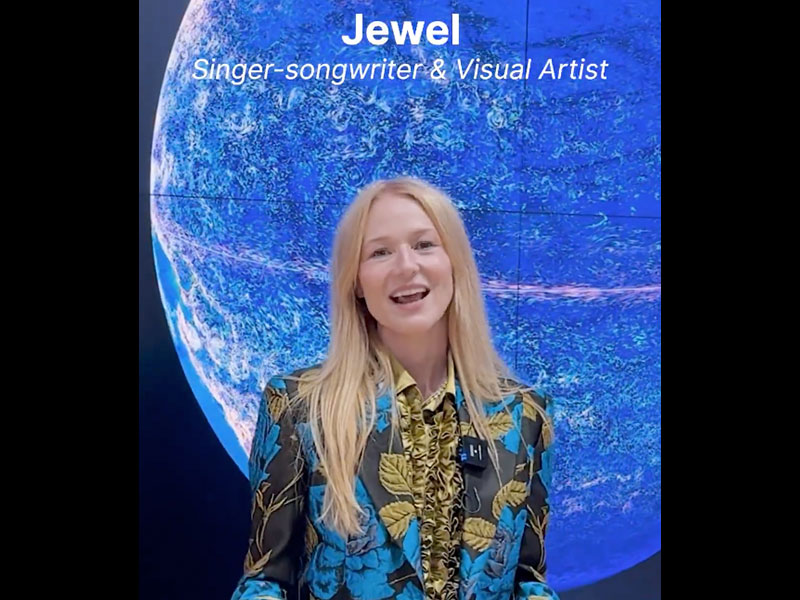News & Updates
[22-Dec-2025]
Jewel, a singer-songwriter and visual artist, used data from NASA's ECCO ocean model in her latest artwork!
[May 19-30, 2025]
Join us for an in-person, hands-on exploration of ocean state estimation, held from May 19 to May 30, 2025, in the beautiful coastal setting of the Asilomar Conference Center in Pacific Grove, California. The ECCO Summer School program will blend lectures, interactive tutorials, peer-to-peer learning, and collaborative team projects to provide a deep dive into the principles, products, applications of ocean state estimation.
[03-Mar-2025]
Historically, the ocean has been difficult to model. Scientists struggled in years past to simulate ocean currents or accurately predict fluctuations in temperature, salinity, and other properties. As a result, models of ocean dynamics rapidly diverged from reality, which meant they could only provide useful information for brief periods. In 1999, a project called Estimating the Circulation and Climate of the Ocean (ECCO) changed all that.
[October 14-18, 2024]
[21-Dec-2023]
Join us for a 5-day ECCO hackathon at the Caltech Keck Institute for Space Studies 14-18 October 2024. Participants will learn how to access and utilize ECCO V4 global ocean and sea-ice state estimates for various ocean and climate analyses. Participants will have the opportunity to work on team projects that focus on different kinds of analysis of ECCO estimates, including comparisons with data. Don't miss this chance to enhance your expertise, collaborate with peers, and contribute to advancing our understanding of ocean circulation and climate.
[March 20-22, 2024] The ECCO Annual Meeting was held at the University of Texas at Austin on 20-22 March, 2024. The first two days focused on ocean dynamics, high-resolution applications, biogeochemistry, and new frontiers. The third day focused on algorithm and tool development, closing with a discussion of broader topics including how ECCO can address societally-relevant issues and ways to engage the broader research community and students.
[04-Mar-2024] ECCO investigator Dimitris Menemenlis (NASA Jet Propulsion Laboratory) was one of the featured speakers at the US CLIVAR Phenomena, Observations, and Synthesis (POS) Panel.
Runoff from one of North America's largest rivers is driving intense carbon dioxide emissions in the Arctic Ocean.
[14-Nov-2023] The Indonesian Throughflow (ITF) is the only low-latitude gateway for export of large amounts of heat and freshwater from the Pacific to the Indian Ocean. The Goddard Earth Observing System (GEOS) atmospheric model coupled with Massachusetts Institute of Technology general circulation (MITgcm) ocean model was run to resolve the flow through these narrow passages.
[10-Oct-2023] ECCO investigator Patrick Heimbach (Univ. of Texas at Austin) was one of the featured speakers at the Task Team on Climate Reanalysis meeting, sponsored by the World Meteorological Organization.
[22-Jun-2023] ECCO investigator Patrick Heimbach (Univ. of Texas at Austin) was one of the featured speakers in the June 2023 National Science Foundation (NSF) Frontiers in Ocean Sciences Symposium.
[21-May-2023] On Earth Day 2023, NASA's Ames Research Center asked researchers to share what excites them about Earth science and explain how they're working to better understand, predict, and protect Earth's life-sustaining water systems.
[25-Jan-2023] The ECCO Annual Meeting was held in the Mudd Building of Geophysics and Planetary Science (South Mudd) at the California Institute of Technology (Pasadena, CA) on 25-26 January. [12-Dec-2022] Many ECCO-related presentations are being presented at the 2022 AGU (American Geophysical Union) Fall Meeting during the week of December 12th. This meeting regularly attracts over 25,000 attendees from 100+ countries to share research and network. [03-Mar-2022] This tutorial at Ocean Sciences 2022 focuses on global multidecadal ocean state estimation: the challenge of reconstructing the three-dimensional, full-depth time-evolving ocean state by combining diverse satellite and in-situ ocean and marine ice data with numerical models in a rigorous and quantitative framework. [02-Mar-2022] This session invites submissions of adjoint model applications to studying the ocean so as to explore the widening range of these investigations. Contributions are sought from all disciplines of oceanography as well as studies concerning computational aspects of model adjoints. [28-Feb-2022] This session invites submissions of adjoint model applications to studying the ocean so as to explore the widening range of these investigations. Contributions are sought from all disciplines of oceanography as well as studies concerning computational aspects of model adjoints. [12-Jan-2022] Our interactive tour guides viewers through the nearly 140 ECCO-related publications and theses released in 2021, a 42% increase over 2020 (view ECCO Research Roundup 2020). The areal coverage of these studies is highlighted on interactive globes, parsed into six categories (Polar Pursuits, Air-Sea Assessment, Life Lessons, Circulation Consideration, Eddy Evaluation, and Other Observations). Interested in seeing ECCO's history of research? Visit our Publications page. [26-Oct-2021] The PO.DAAC is pleased to announce the public release of ECCO Version 4, Release 4b (V4r4b), an errata for the ECCO Version 4 revision 4 (V4r4) ocean and sea-ice state estimate. [03-Sep-2021] The PO.DAAC is pleased to announce the public release of the ancillary data for the (Estimating the Circulation and Climate of the Ocean) ECCO Version 4 Release 4 (V4r4) ocean and sea-ice state estimate. [26-May-2021] ECCO's multi-decadal global ocean state estimate was used to validate ocean temperature changes derived from a new method known as seismic ocean thermometry. [03-May-2021] ECCO simulations will be configured to plan field work and test hypotheses for NASA's "Salinity and Stratification at the Sea Ice Edge" (SASSIE) campaign. Three ECCO simulations — each with its own horizontal grid spacing and vertical resolution — will be employed to address specific science questions. [27-Apr-2021] The PO.DAAC is pleased to announce the public release of the ECCO Version 4 release 4 (V4r4) ocean and sea-ice state estimates. 



